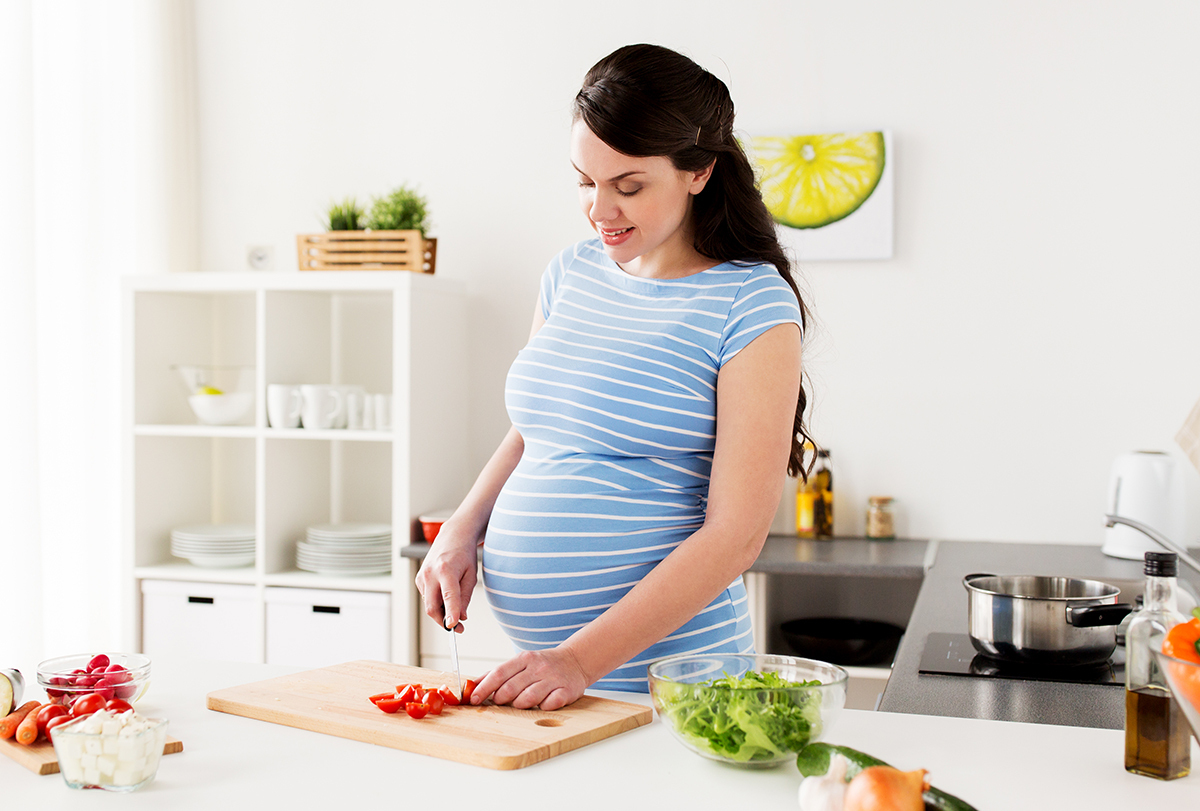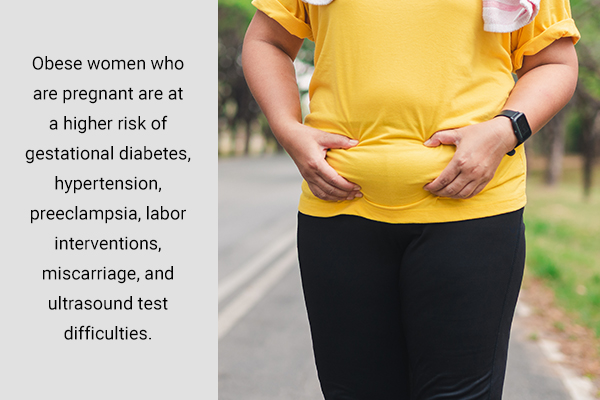Obesity prior to pregnancy or gaining excessive weight during pregnancy increases the risk of gestational diabetes, high blood pressure, and other complications including preeclampsia and the need for a cesarean section. (1)

The amount of weight you should gain during pregnancy is based on several factors, including pre-pregnancy weight and body mass index (BMI). Your health status and your baby’s health are other important factors.
A 2008 study published in Reviews in Obstetrics & Gynecology reports that not only does maternal obesity affect the woman’s health, but also impacts the development and future health of the child. (2)
A mother being overweight or obese is also associated with an increased risk of infant mortality. Not only does this condition increase the mortality of babies who are born at term (or around their due date), but there is an increased prevalence of preterm births in this population of mothers. (3)
A 2017 study published in the American Journal of Preventive Medicine, found that mothers who were heavier prior to pregnancy had an increased risk of behavior problems for their sons. (4)
These are only a few examples of why gaining too much weight during pregnancy should be avoided.
Tips for Healthy Weight Gain During Pregnancy
Here are some tips to control excessive weight gain during pregnancy.
1. Lose weight before planning your pregnancy

Take steps to ensure you’re at a healthy weight before you become pregnant. This will make it easier for you to maintain a healthy weight throughout the pregnancy.
Obese women who are pregnant are at a higher risk of gestational diabetes, hypertension, preeclampsia, labor interventions, miscarriage, and ultrasound test difficulties. (5)(6)
Obesity can also contribute to having a larger baby, which in turn increases the chance of having a C-section. (6)
If you are ready to have a child, consider making a preconception appointment. Your doctor can determine your current BMI and suggest how much weight you may need to lose before getting pregnant and the best ways to approach this.
2. Consult a doctor/midwife and nutritionist
As soon as you have conceived, it is time to see a doctor or midwife and possibly a nutritionist. Your healthcare provider will review your medical history and recommend how much weight you need to lose or gain during pregnancy.
You may also be referred to a registered nutritionist who can help you plan a sensible diet that will help you stay healthy and maintain a healthy weight during your pregnancy.
A nutritionist will suggest the foods that you should eat as well as exercises or workouts that are safe for you and your baby.
Before visiting a nutritionist, write down details of what you eat and drink and what type of exercise you do. This will allow the nutritionist to determine the best plan for you that will fit your lifestyle.
3. Do light exercises

During pregnancy, exercise is important. Moderate exercise can help burn excess calories and keep your weight in check.
Walking or swimming are usually safe forms of exercise for pregnant women. Try to do 30 minutes of light exercise like walking or swimming three days a week.
Regular exercise and keeping your body fit will also help with general aches and pains as you get to the end of the pregnancy.
Walking would be a good exercise for pregnant women, as it isn’t too strenuous. A way to test whether the activity is strenuous or not is that you should be able to maintain a conversation while exercising. If you find yourself out of breath, then you would need to reduce the intensity of the exercise. (7)
To stay motivated to exercise, make a walking date with a friend or your partner.
4. Don’t eat for two
Overeating during pregnancy is common and can have negative short and long-term impacts on the mother and her unborn child. (8) It is important to remember you are not really “eating for two” as so many people have mistakenly done in the past.
Your body does not need many extra calories a day to nourish your growing baby. You simply need 340 extra calories daily in the second trimester (second 3 months) and 450 extra calories daily in the third trimester (last 3 months). (9) You can fulfill this requirement by drinking two glasses of milk (around 100 calories each) and eating one extra serving of whole grains (around 100 calories).
Focus on small, frequent meals that are high in lean proteins, fruits and vegetables. Foods that pack a big nutritional punch and help you feel satisfied are nuts, raisins, cheese and crackers, dried fruit, and yogurt. Eating a healthy snack every three hours should help you avoid overeating at mealtimes.
5. Drink plenty of water

Proper hydration is important to maintain a healthy pregnancy. Drink plenty of water throughout the day to help your body flush out toxins and stay hydrated. Early studies show that staying properly hydrated can even help reduce the rate of obesity. (10)
A 2012 study published in the Journal of Ultrasound in Medicine reports that in pregnancies complicated by isolated oligohydramnios (low amniotic fluid), hydration therapy significantly improves the quantity of amniotic fluid. (11)
It is recommended to drink 8 to 10 glasses of hydrating fluids per day. Do not substitute water with soft drinks and colas that contain calories, and avoid caffeine which can have dehydrating effects on the body. In addition, you can eat more water-rich fruits and vegetables like watermelon, cucumbers, and others.
6. Start cooking
It is important to eat a healthy diet during pregnancy for many reasons, but one of them is to maintain a healthy weight. When you eat home cooked meals, you know what you are eating and you do not have to worry about the hidden ingredients you can be exposed to when you eat out.
When cooking at home, you have full control over the nutritional content and the healthfulness of the foods you eat. This also means you are providing healthy nutrition to your unborn baby.
In addition, homemade food can prevent you from gaining excess weight when you avoid deep or pan-frying your food and opt for healthy cooking techniques like stir-frying, roasting, grilling, broiling, and poaching. (12)
Use and prepare foods only with little salt, sugar, and artificial sweeteners for additional benefits.
7. Get proper sleep

Proper sleep and relaxation are essential for a healthy pregnancy.
Poor sleep impacts your hunger and fullness hormones and even encourages late-night snacking which can have negative effects on a healthy weight. (13)
Otherwise known as Night Eating Syndrome, it is strongly related to obesity, with frequent snacking at night also associated with an increased risk of psychological disturbances. (14)
Get a good night’s sleep of 6 to 8 hours daily. The best way to do this is to stick to a schedule, going to sleep and waking up at the same time every day.
As an additional resource, the Center for Disease Control and Prevention (CDC) provides guidelines for weight gain during pregnancy that you can follow. (9)
Final Word
Weight gain during pregnancy is one thing that all mothers can expect. To ensure a healthy pregnancy and baby, it is better for both the mother and infant to avoid gaining excessive weight though.
- Was this article helpful?
- YES, THANKS!NOT REALLY


